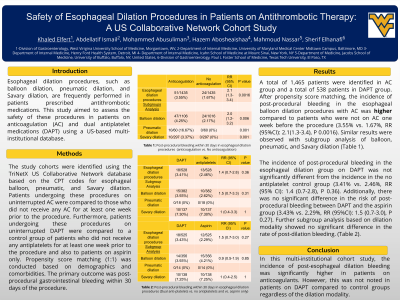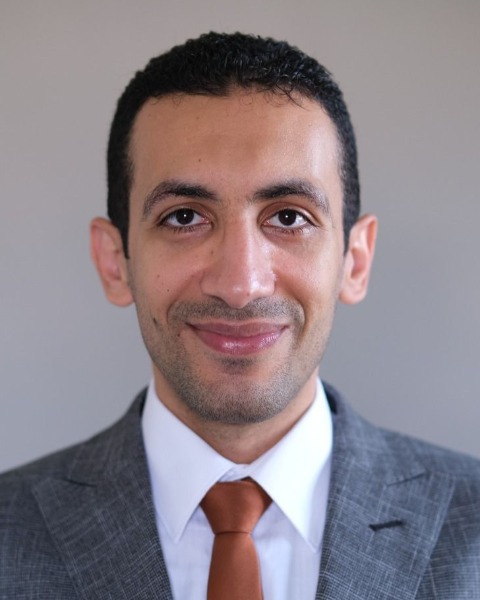Monday Poster Session
Category: Esophagus
P2190 - Safety of Esophageal Dilation Procedures in Patients on Antithrombotic Therapy: A US Collaborative Network Cohort Study
Monday, October 28, 2024
10:30 AM - 4:00 PM ET
Location: Exhibit Hall E

Has Audio

Khaled Elfert, MD
West Virginia University
Morgantown, WV
Presenting Author(s)
Award: ACG Outstanding Research Award in the Esophagus Category (Trainee)
Award: Presidential Poster Award
Khaled Elfert, MD1, Abdellatif Ismail, MD2, Mohammed Abusuliman, MD3, Hazem Abosheaishaa, MD4, Mahmoud Nassar, MD, PhD, MSc, MPA5, Ahmed E. Salem, MBBCh6, Khalid Aloum, MD7, Sherif E.. Elhanafi, MD8
1West Virginia University, Morgantown, WV; 2University of Maryland Medical Center, Baltimore, MD; 3Henry Ford Health, Detroit, MI; 4Icahn School of Medicine at Mount Sinai, Queens, NY; 5Jacobs School of Medicine and Biomedical Sciences, University at Buffalo, Buffalo, NY; 6Maimonides Medical Center, Brooklyn, NY; 7St. Barnabas Hospital, Bronx, NY; 8Texas Tech University Health Sciences Center, El Paso, TX
Introduction: Esophageal dilation procedures, such as balloon dilation, pneumatic dilation, and Savary dilation, are frequently performed on patients prescribed antithrombotic medications. This study aimed to assess the safety of these procedures in patients on anticoagulation (AC) and dual antiplatelet medications (DAPT) using a US-based multi-institutional database.
Methods: The study cohorts were identified using the TriNetX US Collaborative Network database based on the CPT codes for esophageal balloon, pneumatic, and Savary dilation. Patients undergoing these procedures on uninterrupted AC were compared to those who did not receive any AC for at least one week prior to the procedure. Furthermore, patients undergoing these procedures on uninterrupted DAPT were compared to a control group of patients who did not receive any anti-platelets for at least one week prior to the procedure and also to patients on aspirin only. Propensity score matching (1:1) was conducted based on demographics and comorbidities. The primary outcome was post-procedural gastrointestinal bleeding within 30 days of the procedure.
Results: A total of 1,465 patients were identified in AC group and a total of 538 patients in DAPT group. After propensity score matching, the incidence of post-procedural bleeding in the esophageal balloon dilation procedures with AC was higher compared to patients who were not on AC one week before the procedure (3.55% vs. 1.67%, RR (95%CI): 2.1(1.3-3.4), P 0.0016). Similar results were observed with subgroups analysis of balloon, pneumatic, and Savary dilation (Table 1).
The incidence of post-procedural bleeding in the esophageal dilation group on DAPT was not significantly different from the incidence in the no antiplatelet control group (3.41% vs. 2.46%, RR (95% CI): 1.4 (0.7-2.8), P 0.36). Additionally, there was no significant difference in the risk of post-procedural bleeding between DAPT and the aspirin group (3.43% vs. 2.29%, RR (95%CI): 1.5 (0.7-3.0), P 0.27). Further subgroup analysis based on dilation modality showed no significant difference in rate of post-dilation bleeding. (Table 2).
Discussion: In this multi-institutional cohort study, the incidence of post-esophageal dilation bleeding was significantly higher in patients on anticoagulants. However, this was not noted in patients on DAPT compared to control groups regardless of the dilation modality.
Note: The table for this abstract can be viewed in the ePoster Gallery section of the ACG 2024 ePoster Site or in The American Journal of Gastroenterology's abstract supplement issue, both of which will be available starting October 27, 2024.
Disclosures:
Khaled Elfert, MD1, Abdellatif Ismail, MD2, Mohammed Abusuliman, MD3, Hazem Abosheaishaa, MD4, Mahmoud Nassar, MD, PhD, MSc, MPA5, Ahmed E. Salem, MBBCh6, Khalid Aloum, MD7, Sherif E.. Elhanafi, MD8. P2190 - Safety of Esophageal Dilation Procedures in Patients on Antithrombotic Therapy: A US Collaborative Network Cohort Study, ACG 2024 Annual Scientific Meeting Abstracts. Philadelphia, PA: American College of Gastroenterology.
Award: Presidential Poster Award
Khaled Elfert, MD1, Abdellatif Ismail, MD2, Mohammed Abusuliman, MD3, Hazem Abosheaishaa, MD4, Mahmoud Nassar, MD, PhD, MSc, MPA5, Ahmed E. Salem, MBBCh6, Khalid Aloum, MD7, Sherif E.. Elhanafi, MD8
1West Virginia University, Morgantown, WV; 2University of Maryland Medical Center, Baltimore, MD; 3Henry Ford Health, Detroit, MI; 4Icahn School of Medicine at Mount Sinai, Queens, NY; 5Jacobs School of Medicine and Biomedical Sciences, University at Buffalo, Buffalo, NY; 6Maimonides Medical Center, Brooklyn, NY; 7St. Barnabas Hospital, Bronx, NY; 8Texas Tech University Health Sciences Center, El Paso, TX
Introduction: Esophageal dilation procedures, such as balloon dilation, pneumatic dilation, and Savary dilation, are frequently performed on patients prescribed antithrombotic medications. This study aimed to assess the safety of these procedures in patients on anticoagulation (AC) and dual antiplatelet medications (DAPT) using a US-based multi-institutional database.
Methods: The study cohorts were identified using the TriNetX US Collaborative Network database based on the CPT codes for esophageal balloon, pneumatic, and Savary dilation. Patients undergoing these procedures on uninterrupted AC were compared to those who did not receive any AC for at least one week prior to the procedure. Furthermore, patients undergoing these procedures on uninterrupted DAPT were compared to a control group of patients who did not receive any anti-platelets for at least one week prior to the procedure and also to patients on aspirin only. Propensity score matching (1:1) was conducted based on demographics and comorbidities. The primary outcome was post-procedural gastrointestinal bleeding within 30 days of the procedure.
Results: A total of 1,465 patients were identified in AC group and a total of 538 patients in DAPT group. After propensity score matching, the incidence of post-procedural bleeding in the esophageal balloon dilation procedures with AC was higher compared to patients who were not on AC one week before the procedure (3.55% vs. 1.67%, RR (95%CI): 2.1(1.3-3.4), P 0.0016). Similar results were observed with subgroups analysis of balloon, pneumatic, and Savary dilation (Table 1).
The incidence of post-procedural bleeding in the esophageal dilation group on DAPT was not significantly different from the incidence in the no antiplatelet control group (3.41% vs. 2.46%, RR (95% CI): 1.4 (0.7-2.8), P 0.36). Additionally, there was no significant difference in the risk of post-procedural bleeding between DAPT and the aspirin group (3.43% vs. 2.29%, RR (95%CI): 1.5 (0.7-3.0), P 0.27). Further subgroup analysis based on dilation modality showed no significant difference in rate of post-dilation bleeding. (Table 2).
Discussion: In this multi-institutional cohort study, the incidence of post-esophageal dilation bleeding was significantly higher in patients on anticoagulants. However, this was not noted in patients on DAPT compared to control groups regardless of the dilation modality.
Note: The table for this abstract can be viewed in the ePoster Gallery section of the ACG 2024 ePoster Site or in The American Journal of Gastroenterology's abstract supplement issue, both of which will be available starting October 27, 2024.
Disclosures:
Khaled Elfert indicated no relevant financial relationships.
Abdellatif Ismail indicated no relevant financial relationships.
Mohammed Abusuliman indicated no relevant financial relationships.
Hazem Abosheaishaa indicated no relevant financial relationships.
Mahmoud Nassar indicated no relevant financial relationships.
Ahmed Salem indicated no relevant financial relationships.
Khalid Aloum indicated no relevant financial relationships.
Sherif Elhanafi indicated no relevant financial relationships.
Khaled Elfert, MD1, Abdellatif Ismail, MD2, Mohammed Abusuliman, MD3, Hazem Abosheaishaa, MD4, Mahmoud Nassar, MD, PhD, MSc, MPA5, Ahmed E. Salem, MBBCh6, Khalid Aloum, MD7, Sherif E.. Elhanafi, MD8. P2190 - Safety of Esophageal Dilation Procedures in Patients on Antithrombotic Therapy: A US Collaborative Network Cohort Study, ACG 2024 Annual Scientific Meeting Abstracts. Philadelphia, PA: American College of Gastroenterology.

